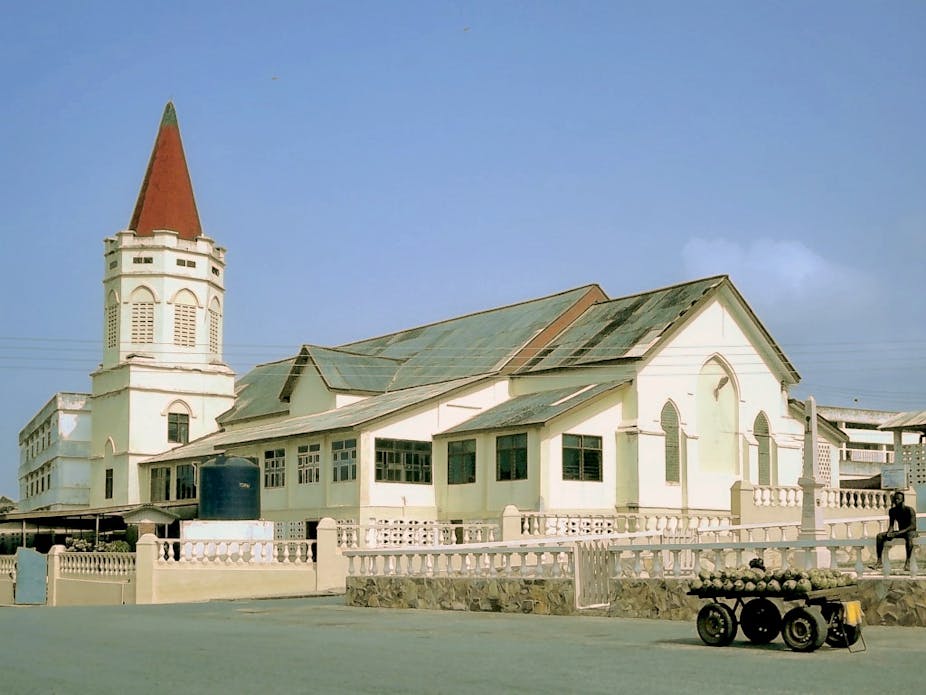Ghana is constitutionally a secular state. This means religious liberty is guaranteed, and all citizens are free to believe and manifest any religious faith. No political parties are allowed to base their appeal on religion.
However, the situation is changing. Church leaders are becoming more vocal on issues of national interest in Ghana. The Church of Pentecost recently proposed setting up a Christian morality council to oversee private and public behaviour. Some Christian leaders are also cultivating “insider” status with political elites and developing a high media profile.
They aim to remake Ghana according to their values and beliefs. The question is what impact that will have on democracy.
Many Ghanaians regard the country as a “nation of Christians”. According to the 2021 census, about 71% of the population is Christian. Muslims make up 18%. Followers of indigenous or animistic religious beliefs make up 5%. Another 6% are members of other religious groups or don’t have religious beliefs.
As a scholar of religion and politics, I argue in a recent paper that the “Christianisation” of politics in Ghana is an attempt to deal with Ghana’s serious problem of state-level corruption and to improve democracy. But I don’t believe it will have this effect. Rather, Christian nationalism seeks to push aside people who have other beliefs. That is not a basis for democracy. And trying to influence policy through religion will get in the way of fundamental institutional reforms that are necessary to make the government more accountable and its actions more transparent.
Christianity and politics
Influential expressions of Christianity in Ghana include the burgeoning Pentecostal or Charismatic churches, which in recent years have become the most popular churches in Ghana. Census data puts them at 44% of Christians in the country. These churches tend to have a conservative political orientation, a strong belief in the veracity of the Bible, and a message that the nation is undergoing serious moral decay.
Some leading Christians would like to see Christians governing the country and all of society according to biblical law. Archbishop Nicholas Duncan-Williams, leader of the Action Chapel, one of the most prominent charismatic churches in the country, stated in an interview in 2019 that: Christians “should rule in corporate, politics, the marketplace, everywhere”. The implication is that Christianity should be a dominant social, political and economic expression in Ghana which would project a certain worldview which all Ghanaians, whether or not they are Christians, should adhere to.
The issue is what the appropriate values are to which Ghanaians should adhere. On the one hand, there is a Christian approach, as suggested by Archbishop Duncan-Williams. On the other there is what might be called a “secular” approach where values are not linked to religious belief.
Afrobarometer data indicates that most Ghanaians are socially conservative, for example in relation to the rights of LGBTQI+ people. Many also despair about the country’s perceived moral decay, characterised by serious corruption, and about democratic decline. There has been extra-parliamentary, yet peaceful and pro-democracy, opposition to the government, demanding a new constitution and a more equitable political system.
Democratic decline
Ghana transitioned from several years of military rule to democracy in 1993. It has since conducted several free and fair elections. It has a reputation as a democracy. America’s National Intelligence Council stated in 2008 that “Ghana has emerged as one of Africa’s most liberal and vibrant democracies, reclaiming a position of political leadership on the continent.”
In recent years things have changed under the National Democratic Congress and the New Patriotic Party, both of which have had turns governing the country.
Sweden’s V-Dem (“Varieties of Democracy”) Institute categorised Ghana as a liberal democracy in 2003-2014 and again in 2017-2020. This description changed to “electoral democracy” in 2021 and “autocratizer” in 2022 – indicating steep democratic decline.
The American organisation Freedom House says the decline involves “discrimination against women and LGBT+ people”. It also notes “weaknesses in judicial independence and the rule of law”. It points out corruption, poor public service delivery, political violence and illegal mining.
A Christian solution?
There are several ways to deal with these issues. One is to amend the constitution to reform government and the state, making functionaries more accountable and policies more transparent.
The Church of Pentecost, Ghana’s largest church, with more than three million members, favours another way. It suggests creating a National Morality and Integrity Council with statutory powers to oversee private and public behaviour, even at state level.
The church believes that to improve democracy and reduce corruption it is necessary for practising Christians to play a leading role in society – including government. According to Joyce Aryee, a former government appointee and Christian leader, this would “infest others with their purity” and transform behaviour for the good.
Critics argue, on the other hand, that bringing more Christians into positions of leadership and having a morality council to oversee society would weaken democracy. Ghana must nurture a diversity of beliefs, motivations and behaviours. It could then pursue the common good by drawing on a variety of worldviews, reasoning, values, aspirations and habits – not only those deriving from Christianity.
Mutual respect
Democratic development can only be realised when citizens make a moral commitment to treat each other with the same respect as they would like to receive. It is necessary to care for each other’s wellbeing as one might care for one’s own growth and happiness.
Ghana’s democracy will fail unless the moral agency of citizens works to moderate economic and social iniquities, by reforming democratic institutions.

